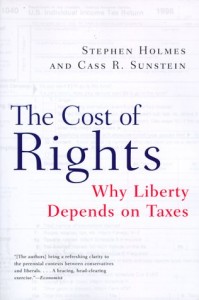 Este livro foi altamente recomendado pelo colega de curso na UCI – Califórnia, e futuro colega de magistratura, Dr. Leonardo Mattos.
Este livro foi altamente recomendado pelo colega de curso na UCI – Califórnia, e futuro colega de magistratura, Dr. Leonardo Mattos.
Book Reviws
Stephen Holmes and Cass R. Sunstein, The cost of rights: Why liberty depends on taxes. New York and London: Norton, 1999. 255 pages.
What do rights costs? As there are no free lunches, there are no free rights. That seems to be the main point of Stephen Holmes and Cass Sunstein in their work on the cost of rights. The book is mainly a criticism of the distinction between negative and positive rights, an idea that can be traced back to Isaiah Berlin’s (1996) distinction between positive and negative liberty, although the authors deny it (p. 239).
Costly versus costless rights?
One major distinction between positive and negative rights has been that positive rights, such as entitlements to welfare, require the state to engage in certain activities and thereby to spend money, whereas negative rights are regarded as free. Ostensibly, it does not cost anything to have property rights, the right to life, freedom of speech, and so on. Holmes and Sunstein’s main criticism of this distinction seems to be that both positive and negative rights require the expenditure of resources, that the state needs to spend money to protect property rights as well as it needs to spend money to provide social benefits. The argument runs that since costs are costs, no substantive distinction can be drawn between positive and negative rights on that basis.
Holmes and Sunstein seem to assume, however, that only publicly administered systems or protecting rights are costly (Ellickson, 1991). They refer to privately administered law, rules enforced by private agencies and arbitrators, treating them as in some way free. The administration of rights is of course not free whether public or private, and so the distinction drawn between positive and negative rights on that ground is quite weak. If it should have any appeal at all, one must also employ a very narrow concept of cost that denies the existence of opportunity costs. Suppose A has a right to x, imposing costs on B who is prohibited from, for example, trespassing on real estate or using a brand in advertising or a patent in production without A’s consent. It would be cheaper for B if A did not own x, even if x would lose its value (as with overexploited land) or not exist at all (as with brands and patents) if someone did not own it. It is obvious that A’s property right imposes costs on others, and that the costs to B would be smaller under some alternative distribution of rights. The authors are therefore certainly right that rights have costs, but their conclusion that rights thereby are indistinguishable from one another in general, and that the distinction between positive and negative rights is useless in particular, is not necessary.
Another problem seems to be that the authors do not have a very clear conception of public goods, as they seem to include public goods among rights. Public goods are certainly costly to produce and cannot be sustained without collective action. It does not follow, however, that the state is the only possible agent for providing public goods. More debatable is the contention that all public goods are rights in the sense of justiciable entitlements to certain goods. One can discuss whether public goods are rights (the right to national defense?, the right to clean air?, the right to highways?), but these rights would be dependent on collective agency in ways that classical individual rights are not.
Ideally government independent rights
Holmes and Sunstein do not mention the distinction between rights that are secured by coercion and rights that are secured by voluntary agreement. A right to property is costly, although establishment or protection of property rights is not under ideal circumstances entirely up to the state insofar as property rights may be voluntarily respected.
A right to welfare presupposes the existence of some coordinating agency that sets the (non-market) principles of benefits distribution and carries them out. (Such an agency would be needed even if the taxes necessary to finance welfare benefits were paid voluntarily.) A right to welfare or some other specific good implies a right to exactly that kind of good, which therefore must be distributed in ways that do not defer to the principles of the free market. By making the right to x a right to the specific good x and not to the value it represents, it is not possible (legally) to trade x in the market; the risks and costs of private contracts involving x are increased and, in the limit, made prohibitive. It follows that non-contractual rights to specific goods are incompatible with the market and some non-market principle of distribution therefore must be found. Hence, non-contractual rights to specific goods inevitably entail government (i.e., coercive) provision in a way that, e.g., private property rights, do not.
The relation between legal rights and government, in the authors’ view, seems to be that government is necessary for any greater system of rights distribution. Holmes and Sunstein do not, however, closely discuss the emergence of government and the system of rights so as to provide a more nuanced treatment of government’s role in sustaining rights. Democratic government is not mainly an agent defined by popular sovereignty, but rather is an agent restrained by popular sovereignty (and, sometimes, as in the case of constitutional government, a restraint on popular sovereignty).
Negative rights as special rights for welfare?
Another issue raised by Holmes and Sunstein is that the concept of negative rights is not viable in confrontation with welfare rights. Religious liberty is a typical negative right. The authors discuss that case in the context of a positive entitlement, an unemployment benefit, requiring recipients to apply for jobs. Is a benefactor who, because of his religious conviction that working on Sundays is a sin, rejects a job offer and hence has his benefits withdrawn a victim of a violation of his religious liberty or is he just a person who did not comply with the rules?, the authors ask. Even if these questions are important, they do not affect the distinction between positive and negative rights, although they do affect the patterns of distribution in a society in which perfectly negative rights, such as religious liberty, are exercised freely.
The main patterns of distribution in a society may arise from market transactions even if such outcomes are continually modified by other principles of distribution, such as public welfare, private intergenerational transfers, and so on. Benefits provided as positive rights do to some extent change the patterns of distribution in a society as they also change the economic conditions underlying transactions on the market. Negative rights are consequently not rights that call for certain kinds of distribution arrangements or certain protections for such arrangements. The question whether such benefits should be conditioned on the benefactors’ (e.g.) religious convictions is a question of fairness in the relations between the state and its citizens. Negative as well as positive rights may be distributed in a discriminatory fashion; that does not, however, alter their character as rights.
A non-rationalist theory of government?
The dilemma of Holmes and Sunstein in their efforts to dismantle the distinction between positive and negative rights is that they assume that the state is the only possible guardian of rights and, moreover, they seem to invoke great differences between the state and other actors. Of course, there are many differences between the state and a private firm or the state and an individual, and the restraints imposed on the state in constitutional democracies are of utter importance. Holmes and Sunstein’s theory of rights implies a theory of the state that greatly departs from a rationalist understanding of government that, if not denying, at least overlooks problems in the relations between principals and agent and problems of accountability.
It is unwise denying the special character of government when it comes to power (distinguishing the relation between government and citizens from all other relations of power in liberal political thought), but it is equally unwise arguing that government is not as self-interested as we suppose other actors are.
CARL LEBECK, Department of Law, Stockholm University

